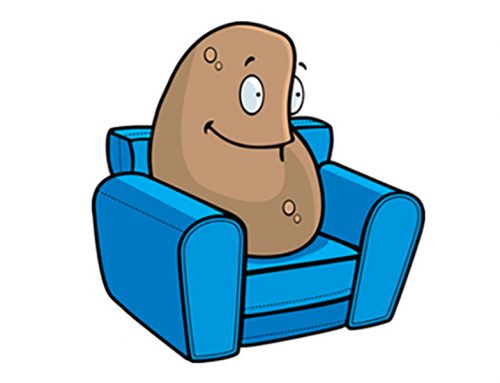I have very little interest these days in all the media-hyped stories of dramatic, rapid losses of body weight. That doesn’t impress me, for numerous reasons. For example,weight is not fat. “weight” could be composed of mostly leantissue, or it could be mostly water weight. In fact, I would even go a step further and point out that rapid loss of bodyweight correlates very highly with a greater chance of relapse, weight re-gain and long term failure.
So what does impress me? What gets my attention?…
I pay attention to what the “long term maintainers” have tosay – those are the people who have maintained an ideal weight for over a year…preferably even 2-5 years or more.

Mike Ogorek is a successful maintainer, having lost
137 pounds and kept it off now for nearly 2 years
The difference between losers and maintainers
As I was researching this subject of long term maintenancerecently, I was surprised at the huge amount of researchthat’s already been done in this area.
One paper that caught my interest was published by Judy Kruger andcolleauges in the International Journal of Behavioral Nutrition andPhysical Activity, titled,
“Dietary and physical activity behaviors among adults successfulat weight Loss maintenance.”
This was not an experimental study, but a compilation of data fromthe “Styles survey” which was representative of the US populationand asked respondents questions about strategies to aid withmaintaining an ideal weight.
In this particular survey, only one-third (30.96%) or the respondents said they weresuccessful at keeping their weight off. The researchers wanted toknow the difference between the small group that was successfuland the majority that were not.
There were a lot of similarities among maintainers and non maintainers:
Both groups reduced the amount of food they consumed, they atesmaller portions, more fruits and vegetables, fewer fatty foodsand fewer sweetened beverages.
Not really any surprises there, but what we want to know mostis not what losers and maintainers have in common, but what themaintainers did that the losers didn’t.
four major differences emerged:
A significantly higher proportion of successful maintainers reportedexercising 30 minutes or more daily, and they also reported addingother physical activity (recreation, sports, physical work, etc) totheir daily schedules.
Lifting weights was also a distinguishing factor between groupsas substantially more successful maintainers included weighttraining in their exercise regimens than did the losers.
“Reducing sedentary activities” was also a significantdifference between those who successfully maintained and those whodid not (less TV watching, etc).
Many things are hotly debated among obesity and exercise science researchers today, but just abouteveryone agrees that exercise is critical for long term maintenance.
The next big difference that separated the successful maintainers fromthe unsuccessful was in their “self-monitoring behaviors” including:
- tracking calories
- tracking body weight
- planning meals
- tracking fat
- measuring amount of food on plate
Unfortunately, these types of self monitoring behaviors, especially weighingand measuring food, planning meals on paper and counting calories, areamong the most avoided or even criticized techniques. Some “experts” evenclaim that it’s unnecessary to count calories, track results, weigh yourselfor measure and weigh your food.
However, these self monitoring behaviors are being identified more and more frequently as part of”the difference that makes the difference.” I agree, as they have alwaysplayed a major role in my own Burn The Fat program
A fourth and final difference was that people who reportedself-perceived “barriers” to their success were 48-76% lesslikely to be a successful maintainer.
For example, they said they had no time to exercise, they were tootired to exercise or it was too hard to maintain an exercise routine.(I interpret this as: unsuccessful maintainers were excuse makers!)
Based on these findings (and the previous research confirmed bythese findings), here are…
THE TOP 4 STRATEGIES TO BE A SUCCESSFUL MAINTAINER
1. Increase activity, including formal exercise as well as sports,physical work or recreational activity.
2. Include weight training as part of your formal exercise program
3. Track and monitor everything – count and track calories and nutrients,measure your food portion sizes, plan your meals and menus in writing andmonitor your body weight.
4. Avoid excuses and maintain positive beliefs and attitudes towards yourenvironment and what you perceive as “barriers” (for example, “I can alwaysmake time for what is most important to me” versus, “I don’t have time toexercise,” etc.)
If you’re currently engaged in the fat loss journey, and you want toknow how good your odds are for being a successful maintainer, it’spretty easy to predict using these simple guidelines.
If you’re not using all 4 of these strategies yet, then when today wouldbe a good time to start?
There are limitations to survey results such as these, including the factthat they are cross sectional, and therefore cannot prove causality.
However, I believe these findings are important and significant.
Not only do they match previous similar studies and agree with the findingsof other groups of successful maintainers (such as the National Weight Control Registry), I found that these results match precisely what I’ve seenamong my most successful “Burn The Fat” clients.
THIS is the type of advice I’d suggest you listen to the most: Adviceabout how to lose bodyFAT (not bodyWEIGHT) and how to maintain an ideal bodyweight and body composition over the long haul, not howto lose it as fast as possible.
In closing, I’d urge you to consider the words of EM Gray,who in “The Common Denominator Of Success” wrote:
“The difference between successful and unsuccessful people is thatsuccessful people are willing to do what the unsuccessful people arenot.”
Your friend and coach,
Tom Venuto
www.BurnTheFat.com
www.BurnTheFatInnerCircle.com
PS There was one more difference that made the difference that I forgotto mention. And this one may surprise you (although it doesnt surprise me).Successful maintainers were LESS likely to take over the counter dietproducts (pills, etc)
Copyright 2007, Burn The Fat Blog.com. Do not copy






Great post Tom! Really appreciate the advice.
Tom wrote:”There was one more “difference that made the difference” that I forgot to mention. And this one may surprise you (although it doesn’t surprise me). Successful maintainers were LESS likely to take over the counter diet products (pills, etc)”The reason is that they are looking for an easy way forward. The four attributes you mention are absolutely correct. I have done those for 18 months, lost 70lbs of fat and have never in that time, increased my weight.Great advice – but the readers have got to “feel it” instinctively and for themselves otherwise it’s just more words
Hi Mr. Venuto,First of all I wanted to say thank you for sending this. It proves what I have been telling my friends and family about toning, high impact aerobics and having a healthy eating lifestyle. I currently weigh 217 and once was 310. I yo-yo’d with my dieting through the years I admit that BUT it did not have toning, aerobics or really didn’t eat the way I was supposed to.I really feel that if one includes toning, body building, aerobic activity and healthy eating DAILY that they will maintain and keep it off. I have proof of that and the proof is I do all the you recommend while losing and finally maintaining.In the past when I was on the road to weight loss I did not tone or do aerobic activity like I do now (started in January of thisyear and have lost over 20 inches since then, not counting what I lost previous years. I am on the Richard Simmons plan), only did outdoor brisk walking. I can really feel the huge difference in adding toning, weight lifting, aerobic activity to my lifestyle everyday! I can feel the difference and I feel stronger then I ever have. I got introduced to your newsletter by going to your website because I wanted to know more inmformation on toning and the success with weight loss. I have done better with my weight loss this time around then any time in my life thanks to you.I have one of your quotes from a previous newsletter posted to my fridge and to my cabinet in my room so I can remind myself of it every morning. It’s this: “Genetics are not an excuse. The past is not an excuse. Your present condition is not an excuse.You can either make excuses or get results, but you can’t do both.”I used to give excuses in the past one in particular I have hypothyroid. That is a thing of the past. I want results and I am achieving them one day at a time. Thanks for sending your newsletter. I know some things can be harsh that you post, BUT they help me out so much. If someone is offended by it then they are not ready for the challenge or they are pitying themselves to much and I really don’t have any time for it. I try to tell my sisters and friends who are trying to lose weight to do what I am doing and there response is “I am walking that’s all I need to do. I’m toning my legs walking” yeah but you have to tone the rest of your body and walking is not toning. They don’t get it really.But anyway I know this is long and I’m sorry but I just wanted tolet you know how you changed my life and I appreciate it. You will be hearing from me when I reach my goal of 130 pounds next year. I am 5’3″ and 37 years old and instead of having a botox body I will say Hi I am Patty and I have a Venuto body…LOL. Thanks again and keep those newsletters coming!Patty )
Excellent post Tom!!I am a successful maintainer having lost 118 lbs and keeping it off for almost 2 yrs now. I’m also part of the NWCR.You make very valid points…..and I do need to do better in a few areas myself. But I do not closely track all my calories and do pay close attention to certain levels of carbohydrates(fruit and starches) that I eat each day as I follow the SBD. I know that I need to track my fats better than I have been.Thanks…and I think that you are brilliant!!
judy, congrats on being a successful maintainer!I find that people do not need to closely track calories after reaching ideal weight, but I notice without a doubt that more successful maintainers DO track during the fat loss phase and I would attribute much of their success to this practice.In fact, although the research statistics say that people who do some type of “maintenance program” have better long term success rates, I would say it is a worthy objective that once into lifelong maintenance phase, that it is better NOT to have to track everything… at this point, you have hopefully passed through the conscious phases of learning and into “unconscious competence” where habits such as tracking portion sizes have become unconscious and automaticBefore you reach your goal and ultimately, become unconscious competent however, there is no better tool for learning and accountability than tracking and journalingmy very best to you,
Tom, I really feel it’s important how someone loses the fat, as well. I’ve done the starvation thing too many times to count. Sure I got to my desired weight, but the process of getting there did not teach me realistic habits to continue for the rest of my life. In fact, I became phobic of healthy fats(fat makes you fat), eating between meals, and just eating too much. If I deviated one ioda from the plan, I considered myself a complete failure and just gave up.It wasn’t until I lost the weight again, relativly healthy, but too low in cals that I came across BTF. My immediate reaction was, there is NO WAY I can eat this much and maintain my 90lb weight loss. So, old habits snuck in gradually and I knew I was on the path to regaining everything that I lost that finally I just surrendered to a combination of your plan, Jon Benson’s plan and Dr. Berardi’s plan. Really, you all are on the same page and I believe that you compliment each other beautifully. I’ve let go of all the fad diets that were keeping me fat. I’m working on my body composition. I focus on bf% rather than the number on the scale. I’m at 16%. I’m not sure what I was at 210lbs, but I know I’ve been as high as 33%.So the continual search of knowledge has brought me to you and the others I’ve mentioned and that has led me to successful maintance(just over a year now…not 2 but I’ll get there) . But I’m not really maintaining. I’m adjusting my goals and moving forward…always forward.Thanks for introducing me to a way of life rather than another fad!
Your newsletter hits the nail on the head!I am 67 years old and I have lost 30+ lb since October of 2004…about 25 lb the first year, 5 lb the second year and 2 lb this year. I used every one of the recommended behaviors.Successful weight loss is a slow matter. Maintenance of that weight loss is dependent on vigilance. I weigh myself every morning and I write my weight down every Monday morning. If I see a weight gain, I am especially carefulto monitor what I eat for several days or until the scale shows a loss.Thanks for telling the truth.Bonnie
Bonnie wrote”Maintenance of that weight loss is dependent on vigilance.”VIGILANCEthat is indeed THE word!”eternal vigilance is the price of freedom” said Thomas Jefferson…. So it is with your health and maintenance of your ideal weight and body comp… vigilance is the price to keep it once you’ve got itthanks Bonnie.
As a past Eating Disorder sufferer I’m an advocate of Intuitive Eating and tracking or counting would send me into a binge, however I do find I mainly crave high protein healthy foods and I do however make time as a busy wife and mother to exercise daily and I include weight training 3 times a week in my routine.I love reading your blog
Awesome article Tom!You wrapped things up with a great quote too. Isn’t that the truth;)Like Mike Ogorek who’s picture and results are displayed above, he was willing to do what it takes in order to accomplish his dreams.From your list of 4 I can see what many people are willing to do and realize that achieving their dream body would be difficult with out them and that is a) including fun activities into their life and b) adding weight training to their life.It is my hope, even though it is plainly printed out in front of them and they’ve heard it many times before… that the people reading your article will actually take your advice and begin to track their food intake and their workout progress.And even more important I hope they can take some time to reflect on any excuses that they’ve imposed on themselves which limit their potential.This is what successful people do, yet the large majority neglect to apply the information.And yes ironically they seek out the latest diet pills even though the successful people don’t.The movement must start to shift away from the diet pill and quick fix programs.You began the movement 4 years ago with Burn The Fat Feed The Muscle, now it’s time for the rest of us to get behind you put an end to the part of the industry that only cares about making money, and making sure that you don’t succeed so you can buy more from them.Your continued research is inspiring. Many others are researching which foods may boost your metabolism a few extra calories a day, or herbs that will help you lose weight, but you hit the areas that matter…You hit the areas that will help people achieve permanent fat loss success and improve their lives overall.You rock bud!Keep up the great work.Scott Tousignant, BHK, CFCUnstoppable Fat LossFit Chic Fat Loss Blog
Hi Tom, this aticle is very helpful to me. Thank you very much and God bless you.i am in my third week of my losing weight programme and this encouraement and advice is very timely.one again God richly bless you.
Posted by: Tom Venuto | June 23, 2007 11:52 AM:“judy, congrats on being a successful maintainer!I find that people do not need to closely track calories after reaching ideal weight, but I notice without a doubt that more successful maintainers DO track during the fat loss phase and I would attribute much of their success to this practice. In fact, although the research statistics say that people who do some type of “maintenance program” have better long term success rates, I would say it is a worthy objective that once into lifelong maintenance phase, that it is better NOT to have to track everything… at this point, you have hopefully passed through the conscious phases of learning and into “unconscious competence” where habits such as tracking portion sizes have become unconscious and automatic. Before you reach your goal and ultimately, become unconscious competent however, there is no better tool for learning and accountability than tracking and journalingWOW Tom!! I’m so impressed that you responded to me!! Thank you!!As an FYI- I did closely track my food by entering all my food into my online journal for the 20 months that it took me to get to my goal weight. I look at it once in a while to see what I was eating. When I reached my goal, it felt as if writing it down had become a crutch and I had to let it go but it was not so easy…I was terrified that without logging my food, I’d go off my plan.But truth be told, I had changed…I feel safe now that I will not go back to my old way of eating, which was horrible, I was a total white flour and sugar addict!!So yes, I have developed an “unconscious competence: with my food but it was all those months of logging it each day that taught me to do this intuitively.I weigh daily and watch my food…I also am part of a weekly maintenance weighin group online….1 1/2 years now…very cool people!!If you are interested, I’ll send you a link to my success story with pictures.Thanks again!!Judy
Hey Tom,Great article! I find your PS to the article to be very interesting. Somehow I’m not at all surprised to hear that the successful maintainers didn’t just rush to buy a pill. They understood that some real lifestyle changes had to be made rather than relying on pills and drugs. That alone is very motivational!
Hi Tom,I totally agree with this research findings(the 4 strategies to be asuccessful maintainer). I managed to maintain my weight for 1 1/2 years by practise this 4 elements in my daily routine. Another key word besides VIGILANT to be a successful maintainer is “PERSISTENT”.The only problem that I face now to break the “PLATEAU” to reduce another few kg and to tone and firm up my body (arm, abs and thigh). This is due drastic weight loss. I lost 23 kg within 6 months (existing 103 kg, height 167cm)just by doing cardio, weight training 5 days a week (at least 200 to 300 min a week) & watch out my food intake.I really have to work hard on it. I did read your Burn The Fat Feed The Muscle.RegardsFADILAH
Hi Tom,it’s such a pity I stumbled upon your site so late as I only recently purchased your e-book Burn the Fat which is nothing less than awesome.I’d like to say I lost 18kg 6 years ago, and have maintained ever since. I lost it using a fruit diet (not the best diet I know) and have been struggling to maintain it over the last 2 – 3 years. Now that I have the information from your book, I think I’ll do better. My goal is to reach 12% bf in December 2007 (now 18%) and I know I’ll succeed. I’m looking forward to my first newsletter!